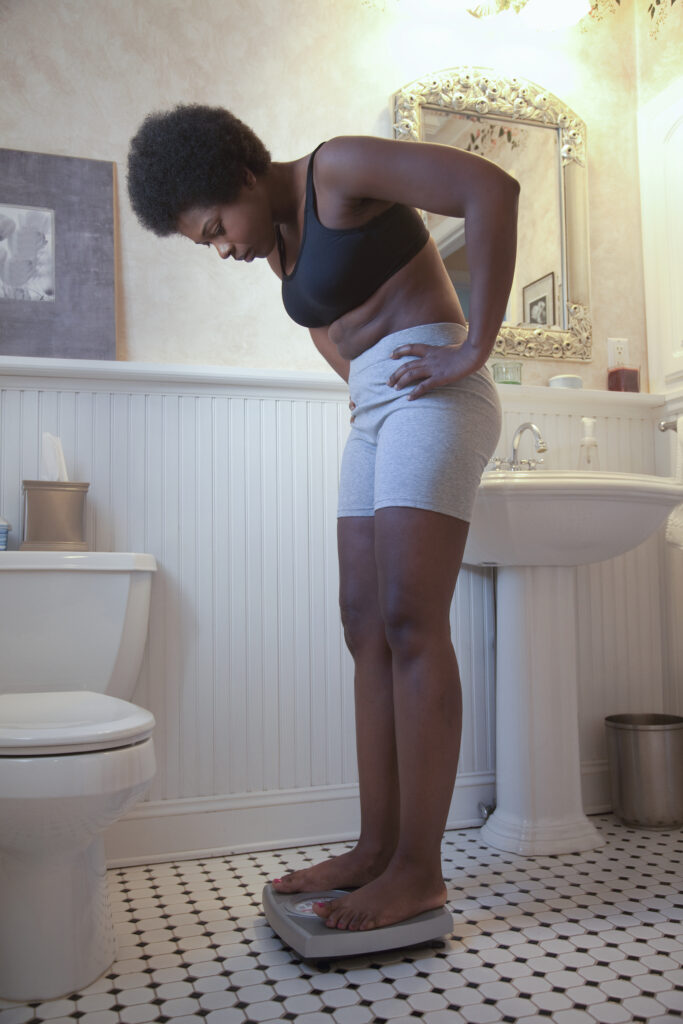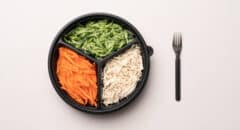
Yes, dieting is hard, and most weight-loss behaviors are unlikely to cause harm since most people can’t keep them up for a long period of time. But other types of diets, from drastic detox diets to extreme calorie reduction, can cause serious health consequences almost immediately.
“People get so focused on weight loss they are willing to do unproven and potentially dangerous things that can backfire and cause serious health problems,” says Michelle May, MD, an Arizona-based weight management doctor.
Dramatic Weight Loss – It’s Not What It Seems
Yes, any dramatic diet measures can result in quick and dramatic weight loss, but the downside is that, because these are all temporary fixes, the weight loss not only will not be long-term, but in many cases, will reappear quickly, sometimes along with a few extra pounds. Aside from these diets being non-permanent solutions, medical experts are also alarmed by the extreme dangers that these women are putting themselves at risk for.
“Rapid weight loss increases the risk of heart arrhythmias, dehydration, and electrolyte disturbances,” says Ethan Lazarus, a family doctor in Denver who specializes in obesity medicine. “Shedding pounds this quickly, he says, makes it likely that you will lose more lean body mass and water than fat. This can slow metabolism and result in an instant regain of weight once you go off the diet. You may gain more than you lost,” says Lazarus.
Experts also point out that your waistline isn’t the only thing that suffers from rapid weight loss. Other effects include shrunken fingers and feet and a drooping face, which can result in a loose wedding ring, flopping shoes, and a blushing bride with a dull expression.
So what should you NEVER do for the sake of losing pounds?
RELATED: 7 Things You Should Never Do To Lose Weight!
1. Stop Eating Meals / Starve Yourself
Severely slashing calories can lead to weight loss, but the lost weight includes precious muscle mass and poses health risks — and most people end up regaining all the weight, plus some.
“Rapid weight loss by critical calorie restriction causes water, some fat, and muscle loss, which ultimately decreases metabolism so the body needs fewer calories to survive,” says May, author of Eat What You Love and Love What You Eat. It also causes a shift toward a higher percentage of body fat, which increases the risk for metabolic syndrome and type 2 diabetes.
Don’t cut calories below 1,200 per day; otherwise, you will struggle to meet nutrient needs, fuel activity, and satisfy hunger. Keep in mind that when you lose weight quickly, you tend to pack it back on with more fat and less muscle, which lowers your metabolism and calorie needs.
2. Take Supplements That Make Incredible Statements
If it sounds too good to be true, it probably is. Diet pills, flat tummy teas, potions, and concoctions purchased over the counter or ordered online are unlikely to be effective, not necessarily safe, or capable of delivering on the oft-exaggerated promises.
Over-the-counter diet pills may not appear to be dangerous, but they can still cause harm. “Most diet pills are nothing more than a quick fix loaded with caffeine and diuretics that can lead to dehydration and electrolyte imbalance,” says Diekman, director of nutrition at Washington University in St. Louis.
The FDA does not give supplements the same scrutiny as prescription drugs. Some over-the-counter or Internet products “can be harmful, ineffective, and a waste of money,” says American Dietetic Association spokeswoman Jeannie Gazzaniga-Moloo, PhD, RD.
The FDA urges people to report dangerous supplements through its MedWatch program. Buyers beware: Just because it says it is natural, it doesn’t necessarily mean it is safe or good for you.
The hCG (human chorionic gonadotropin) diet is a good example of a plan that is not FDA-approved for weight loss, yet legions of dieters are using it. Weight loss from The hCG Diet, May says, likely has more to do with the 500-calorie restriction, not the hCG from the urine of pregnant women. It has the same risks as a very low-calorie diet, along with unknown risks associated with long-term use of hCG. Some doctors even dispense risky therapies from their offices that are not approved for weight loss.
Forget supplements and diet pills. Instead, Moloo says, rely on healthy foods to help you lose weight.

3. Rely On Cleanses/Detox Programs
Most cleanses cause weight loss from water and stool weight, at best, but they can be dangerous and carry risks of dehydration, electrolyte imbalance, and more.
“Losing lots of fluid without medical supervision is risky and, when combined with fasting, even riskier. Your body is uniquely fine-tuned to detoxify and excrete toxins, so many cleanses are unnecessary and can lead to serious complications by messing with your body’s finely-tuned system,” May says.
Instead of detoxifying, be more mindful of what you eat. If you want to cleanse or detoxify your body, drink plenty of water and eat lots of high-fiber foods.
4. Purge
Purging includes making yourself vomit, chewing food and spitting it out, and abusing laxatives. “These unhealthy and unsafe behaviors are not uncommon on college campuses, pose serious health problems, and are the first step in the development of eating disorders,” says Diekman, who counsels students with eating disorders at Washington University.
Acid in the stomach is extremely strong, which is necessary to prepare food for digestion and absorption. Stomach contents are meant to stay in the stomach, not be regurgitated into the esophagus and mouth. “Extremely acidic vomit can cause erosion in the esophagus, mouth, and on tooth enamel, which can increase risk for certain cancers, tooth decay, and more when purging becomes a ritual,” Diekman says.
Regular purging by vomiting or abuse of laxatives also causes excess fluid loss that can cause serious dehydration and electrolyte imbalances.
All of these forms of weight loss are dangerous, but the most dangerous is the use of syrup of Ipecac, Diekman says. “One dose can trigger cardiac irregularity and can lead to cardiac arrest.”
Purging in all its forms is no way to whittle down the waistline; it is extremely dangerous and not recommended by experts. Eating and drinking responsibly is a much healthier and safer weight loss approach, but if you cannot control your behavior, seek medical help.
RELATED: 8 Cheap Ways to Lose Weight & Eat Healthy
5. Exercise Too Much
Extreme exercise may make for good reality television, but in the real world, it can cause grave problems. Extreme exercise is physically intense on the body, causing severe wear and tear, increasing the risk for injury, dehydration, electrolyte imbalance, and psychologically turns exercise into punishment for eating, says May.
The American Academy of Sports Medicine and American Heart Association recommend getting at least 30 minutes daily, five days a week of moderately intense cardio or 20 minutes daily, three days a week of vigorous intense cardio, and eight to 10 strength-training exercises, eight to 12 repetitions, twice weekly.
Despite the recommendations from authorities, some people think more is better and go way beyond what’s healthy, and obsessive exercise controls their lives in an unhealthy manner.
Engage in regular physical activity for all the health benefits, including stress relief, because if you ignore the stressors in your life, it can cause the release of hormones such as cortisol that increase appetite and fat storage, Moloo says.
6. Taking Drugs Not Prescribed for Weight Loss
Using drugs other than prescription weight loss drugs intended for weight loss is a grim mistake and fraught with all kinds of consequences.
“The potential risks associated with abusing drugs, such as cocaine, speed, attention deficit disorder, thyroid, and diabetes medications to lose weight far outweighs any health benefit you may get from the weight loss,” Moloo says. Just some of the unintended risks include, “physical and psychological addiction, social and financial problems, strain on relationships, anxiety, severe headaches, stroke, heart, lung, and kidney problems.”
Using illegal drugs for any purpose is strongly discouraged, and using legal drugs for their unintended purpose without medical supervision is dangerous.
7. Use Someone Else’s Diet
Everyone’s body is different. What works for someone else may not work for you in the long run (remember Keto diets?). Choose a diet that works for your lifestyle. Studies show the best diet is the one you can stick with long term. Use common sense, listen to your body, be mindful of what you eat, and pass on expensive, risky, and worthless weight loss schemes or products that are unproven.
Seek expert advice from your doctor or a registered dietitian if you are concerned that your weight loss methods may be bordering on extreme or unhealthy.








